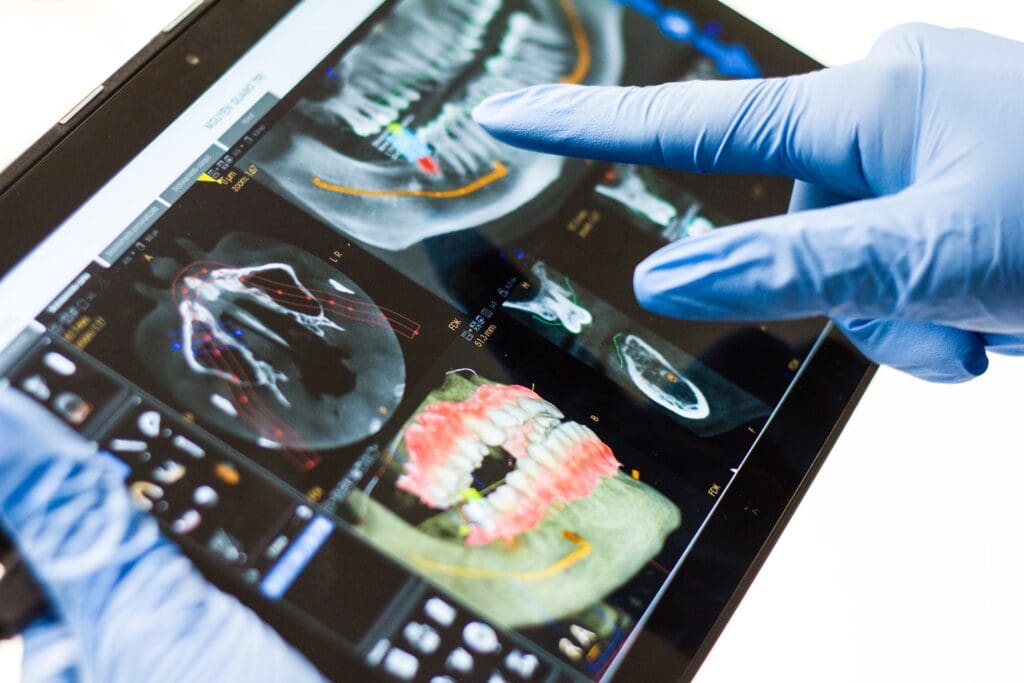Gum disease is an infection or inflammation of the gums caused by the buildup of bacteria, plaque, and tartar on the teeth. If left untreated, the bacteria can cause the gums to recede away from the teeth and create pockets that are difficult to clean with a toothbrush.
If not treated properly, gum disease can worsen and cause tissue destruction and loss of teeth and bones. Fortunately, preventive measures such as proper oral hygiene and regular dental check-ups can help keep gum disease at bay. It is important to visit a dentist to prevent and treat gum disease.
With that said, here are the four stages of periodontitis in progression:
Periodontitis Stage 1 (Initial)
If left untreated, gingivitis can cause severe damage to the gums and surrounding teeth. The bacteria and plaque that accumulate at and below the gum line cause inflammation. Debridement, a deep cleaning, is necessary to treat periodontitis stage one, which is irreversible, unlike gingivitis.
Periodontitis Stage 2 (Moderate)
Initial periodontitis is a mild form of gum disease that usually does not cause any visible damage to the ligaments of the tooth’s root and socket. It may not be noticeable and is usually reversible with proper treatment. Moderate periodontitis, on the other hand, is a more advanced form of gum disease that causes visible damage to the ligaments of the tooth’s root and socket. This damage is usually permanent and can lead to tooth loss if left untreated.
Periodontitis Stage 3 (Severe with Potential Tooth Loss)
When stage three periodontal disease is present, the gums may have receded so far that the teeth look longer. You may also feel that your teeth are loose or shifting because the gums are no longer securely holding them. Surgery may be the only way to treat the condition at this stage. If the damage is too severe, the teeth may be beyond salvaging and may have to be pulled out.
Periodontitis Stage 4 (Severe with Potential Loss of All Teeth)
At this point, a person suffering from periodontal disease may have lost quite a few teeth. Since the condition is so advanced, they may need to let go of even more teeth. Patients in periodontitis stage four have few options and may be referred to an experienced periodontist to assist them with their condition.
Periodontal Scaling and Root Planing: The Answer to Gum Disease
Periodontal scaling and root planing is a dental procedure that involves removing plaque and tartar buildup from the teeth’ surface and smoothing the teeth’ roots to prevent future buildup of plaque and tartar. It is a common treatment for gum disease.
Periodontal scaling and root planing are a form of deep cleaning that doesn’t require surgery. This type of cleaning is performed with tools that are either handheld or utilize ultrasonic technology.
It has been found that ultrasonic deep cleaning is just as effective as manual deep cleaning with handheld instruments. Although both treatments can yield excellent outcomes, ultrasonic cleaning is more efficient and can be completed much shorter, taking roughly 20 to 50 percent less time than manual cleaning.
Conclusion
Periodontitis is a serious and progressive condition caused by bacteria that can destroy the soft and hard tissues surrounding the teeth. With proper treatment, it is possible to effectively manage the disease and improve the health of the gums. Seeking early treatment for periodontitis to prevent further damage and improve the long-term prognosis is crucial.
Danvers Aesthetic Family Dentistry is your local dentist in Danvers, offering everything from basic services, like general cleanings and exams, to more complex procedures, like implant surgery and gum disease treatment. We have a long-standing reputation for providing gentle, comfortable dental care. If you’re looking for the best dentist in Danvers, MA, look no further! Call our office at (978) 774-0725 to book an appointment!

